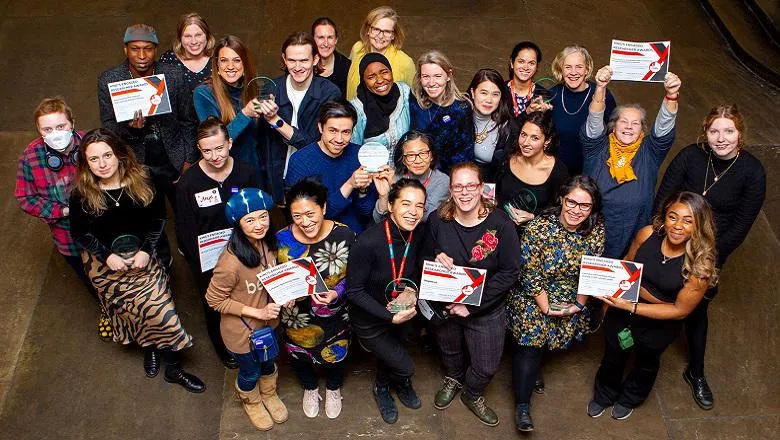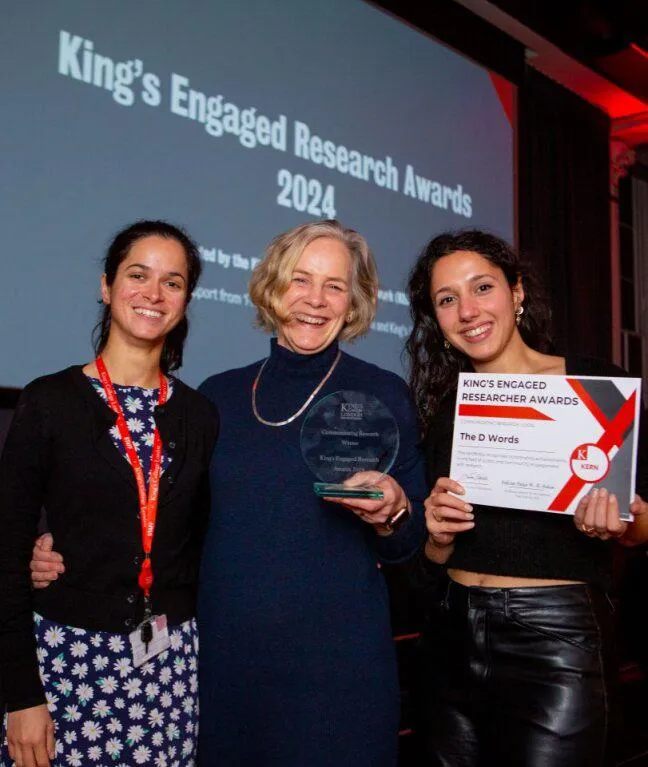'This was an excellent and solid example of best practice public engagement which engaged the public with a really important topic. It was great to see the activity run somewhere they could engage with a new audience, and it is clear the exercises were well tailored to this group, given the high levels of engagement demonstrated.'
King's Engaged Research Awards judging panel
09 February 2024
Nursing, midwifery & palliative care research success at inaugural King's Engaged Research Awards
The inaugural ceremony was a celebration of public and community engagement in research at King's and awarded staff, students and community partners.

Congratulations to colleagues from the Faculty of Nursing, Midwifery and Palliative Care and the Cicely Saunders Institute on their wins at the inaugural King's Engaged Research Awards ceremony.
On 16 January 2024, over 130 staff, students, and community partners gathered at the Great Hall to celebrate best practice in public and community engagement with research at King’s. The awards were hosted by hosted by Professor Funmi Olonisakin, Vice President (International, Engagement & Service) and Professor Bashir M. Al-Hashimi, Vice President (Research & Innovation).

Communicating Research: D-Words
EMBED-Care colleagues from UCL, Dr Charlotte Kenten and Sophie Crawley and Public and Patient Involvement Members.
The EMBED-Care team were selected for their work engaging young people about palliative dementia care research at a Science Museum event. For this event celebrating the 75th birthday of the NHS in July 2023, the team developed a suite of activities, collectively named ‘the D words’. Visitors were invited to take part in activities including a card game, a wishing tree, and a myth buster quiz, as well as having the opportunity to chat to the research team about dying with dementia.

Transforming Research Culture or Public Life: Implementing a co-developed public involvement strategy for palliative care research
Lived experience experts: Margaret Ogden, Rashmi Kumar, Pam Smith, Marion Sumerfield, Alan Quarterman.
King’s staff: Dr Lisa Brighton, Dr Sarah Crabtree, Beka Torlay, Cat Harvey, Halle Johnson, India Tunnard, Tofunmi Aworinde, Dr Joanne Bayly, Joanna Goodrich, Juliet Gillam, Monica Oancea, Dr Steve Marshall, Professor Catherine Evans.
This group of researchers and lived expert members co-developed and implemented a Public Involvement Strategy to strengthen meaningful collaboration with lived experts and community partners, and enrich research at the Cicely Saunders Institute. The strategy has ensured that public involvement is at the core of the institutes research culture, has led to increased diversity of members involved, increased influence at a strategic level and partnerships with other organisations to build local, national and international capacity in public involvement in palliative care.
'The panel praised this initiative for embedding the role of lived experience contributors at the core of the Institute’s research Culture while also making tangible contributions to build the capacity for public involvement in palliative care more widely.'
King's Engaged Research Awards judging panel
Other Faculty projects were shortlisted for awards, including:
- The Feeling at Home Project (Dr Deborah Chinn, Dr Katy Brickley, Dr Tony Levitan, Dr Andy Power, Shalim Ali, Benjamin Taylor)
- ACCESSCare C Project (Dr Katherine Bristowe, Dr Debbie Braybrook, ACCESSCare C Project Team, LGBT Foundation, LGBT Consortium, Health Equality Rights Organisation, PPI members)
- Implementation of pathways to support Internationally Educated Nurses (Dr Dilla Davis)
NMPC projects were also highlighted in a newsletter by the NIHR ARC South London.
For more information about the awards, please contact King's Engaged Researcher Network at kern@kcl.ac.uk.
